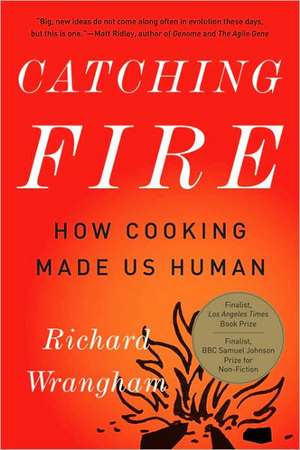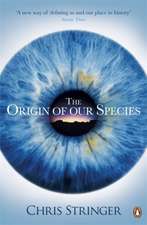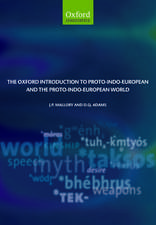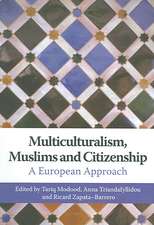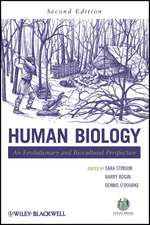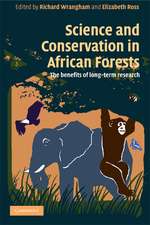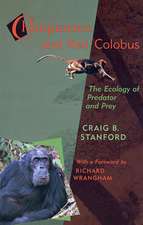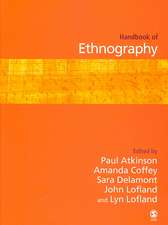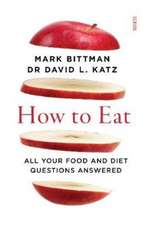Catching Fire: How Cooking Made Us Human
Autor Richard Wranghamen Limba Engleză Paperback – 6 sep 2010 – vârsta de la 13 ani
The
groundbreaking
theory
of
how
fire
and
food
drove
the
evolution
of
modern
humans
Ever
since
Darwin
andThe
Descent
of
Man,
the
evolution
and
world-wide
dispersal
of
humans
has
been
attributed
to
our
intelligence
and
adaptability.
But
inCatching
Fire,
renowned
primatologist
Richard
Wrangham
presents
a
startling
alternative:
our
evolutionary
success
is
the
result
of
cooking.
In
a
groundbreaking
theory
of
our
origins,
Wrangham
shows
that
the
shift
from
raw
to
cooked
foods
was
the
key
factor
in
human
evolution.
Once
our
hominid
ancestors
began
cooking
their
food,
the
human
digestive
tract
shrank
and
the
brain
grew.
Time
once
spent
chewing
tough
raw
food
could
be
sued
instead
to
hunt
and
to
tend
camp.
Cooking
became
the
basis
for
pair
bonding
and
marriage,
created
the
household,
and
even
led
to
a
sexual
division
of
labor.
In
short,
once
our
ancestors
adapted
to
using
fire,
humanity
began.
Tracing
the
contemporary
implications
of
our
ancestors'
diets,Catching
Firesheds
new
light
on
how
we
came
to
be
the
social,
intelligent,
and
sexual
species
we
are
today.
A
pathbreaking
new
theory
of
human
evolution,Catching
Firewill
provoke
controversy
and
fascinate
anyone
interested
in
our
ancient
origins-or
in
our
modern
eating
habits.
| Toate formatele și edițiile | Preț | Express |
|---|---|---|
| Paperback (2) | 68.08 lei 3-5 săpt. | +23.07 lei 6-12 zile |
| Profile – 26 mai 2010 | 68.08 lei 3-5 săpt. | +23.07 lei 6-12 zile |
| BASIC BOOKS – 6 sep 2010 | 137.64 lei 3-5 săpt. |
Preț: 137.64 lei
Nou
Puncte Express: 206
Preț estimativ în valută:
26.34€ • 28.16$ • 21.96£
26.34€ • 28.16$ • 21.96£
Carte disponibilă
Livrare economică 27 martie-10 aprilie
Preluare comenzi: 021 569.72.76
Specificații
ISBN-13: 9780465020416
ISBN-10: 0465020410
Pagini: 320
Dimensiuni: 140 x 210 x 21 mm
Greutate: 0.27 kg
Ediția:First Trade Paper Edition
Editura: BASIC BOOKS
Colecția Basic Books
ISBN-10: 0465020410
Pagini: 320
Dimensiuni: 140 x 210 x 21 mm
Greutate: 0.27 kg
Ediția:First Trade Paper Edition
Editura: BASIC BOOKS
Colecția Basic Books
Notă biografică
Richard
Wranghamis
the
Ruth
Moore
Professor
of
Biological
Anthropology
at
Harvard
University
and
Curator
of
Primate
Behavioral
Biology
at
the
Peabody
Museum.
He
is
the
co-author
ofDemonic
Malesand
co-editor
ofChimpanzee
Cultures.
He
lives
in
Cambridge,
Massachusetts.
Recenzii
"[Catching
Fire]
makes
a
convincing
case
for
the
importance
of
cooking
in
the
human
diet,
finding
a
connection
between
our
need
to
eat
cooked
food
in
order
to
survive
and
our
preference
for
soft
foods.
The
popularity
of
Wonderbread,
the
digestion
of
actual
lumps
of
meat,
and
the
dangers
of
indulging
our
taste
buds
all
feature
in
this
expository
romp
through
our
gustatory
evolution."—Seed
Magazine
"Catching Fireis a plain-spoken and thoroughly gripping scientific essay that presents nothing less than a new theory of human evolution...one that Darwin (among others) simply missed."—New York Times
"As new angles go, it's pretty much unbeatable."—San Francisco Chronicle
"Wrangham's attention to the most subtle of behaviors keeps the reader enrapt...a compelling picture, and one that I now contemplate every time I turn on my stove."—Texas Observer
"[A] fascinating study.... Wrangham's lucid, accessible treatise ranges across nutritional science, Paleontology and studies of ape behavior and hunter-gatherer societies; the result is a tour de force of natural history and a profound analysis of cooking's role in daily life."—Publishers Weekly
"An innovative argument that cooked food led to the rise of modern Homo sapiens.... Experts will debate Wrangham's thesis, but most readers will be convinced by this lucid, simulating foray into popular anthropology."—Kirkus Reviews
"Catching Fireis convincing in argument and impressive in its explanatory power. A rich and important book."—Michael Pollan, author ofIn Defense of FoodandThe Omnivore's Dilemma
"Catching Fireis a plain-spoken and thoroughly gripping scientific essay that presents nothing less than a new theory of human evolution...one that Darwin (among others) simply missed."—New York Times
"Brilliant...
a
fantastically
weird
way
of
looking
at
evolutionary
change."
—Slate"As new angles go, it's pretty much unbeatable."—San Francisco Chronicle
"Wrangham
draws
together
previous
studies
and
theories
from
disciplines
as
diverse
as
anthropology,
biology,
chemistry,
sociology
and
literature
into
a
cogent
and
compelling
argument."
—Washington
Post"Wrangham's attention to the most subtle of behaviors keeps the reader enrapt...a compelling picture, and one that I now contemplate every time I turn on my stove."—Texas Observer
"[A] fascinating study.... Wrangham's lucid, accessible treatise ranges across nutritional science, Paleontology and studies of ape behavior and hunter-gatherer societies; the result is a tour de force of natural history and a profound analysis of cooking's role in daily life."—Publishers Weekly
"An innovative argument that cooked food led to the rise of modern Homo sapiens.... Experts will debate Wrangham's thesis, but most readers will be convinced by this lucid, simulating foray into popular anthropology."—Kirkus Reviews
"In
this
thoroughly
researched
and
marvelously
well
written
book,
Richard
Wrangham
has
convincingly
supplied
a
missing
piece
in
the
evolutionary
origin
of
humanity."
—Edward
O.
Wilson,
Harvard
University"Cooking
completely
transformed
the
human
race,
allowing
us
to
live
on
the
ground,
develop
bigger
brains
and
smaller
mouths,
and
invent
specialized
sex
roles.
This
notion
is
surprising,
fresh
and,
in
the
hands
of
Richard
Wrangham,
utterly
persuasive.
He
brings
to
bear
evidence
from
chimpanzees,
fossils,
food
labs,
and
dietitians.
Big,
new
ideas
do
not
come
along
often
in
evolution
these
days,
but
this
is
one."
—Matt
Ridley,
author
ofGenomeandThe
Agile
Gene"Catching Fireis convincing in argument and impressive in its explanatory power. A rich and important book."—Michael Pollan, author ofIn Defense of FoodandThe Omnivore's Dilemma
Descriere
Descriere de la o altă ediție sau format:
Argues that it was cooking that caused the transformation of our ancestors from apelike beings to Homo erectus. This title focuses on the idea: the habit of eating cooked rather than raw food permitted the digestive tract to shrink and the human brain to grow, helped structure human society, and created the male-female division of labour.
